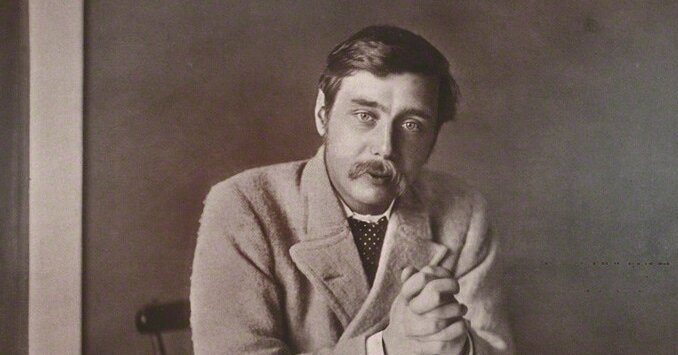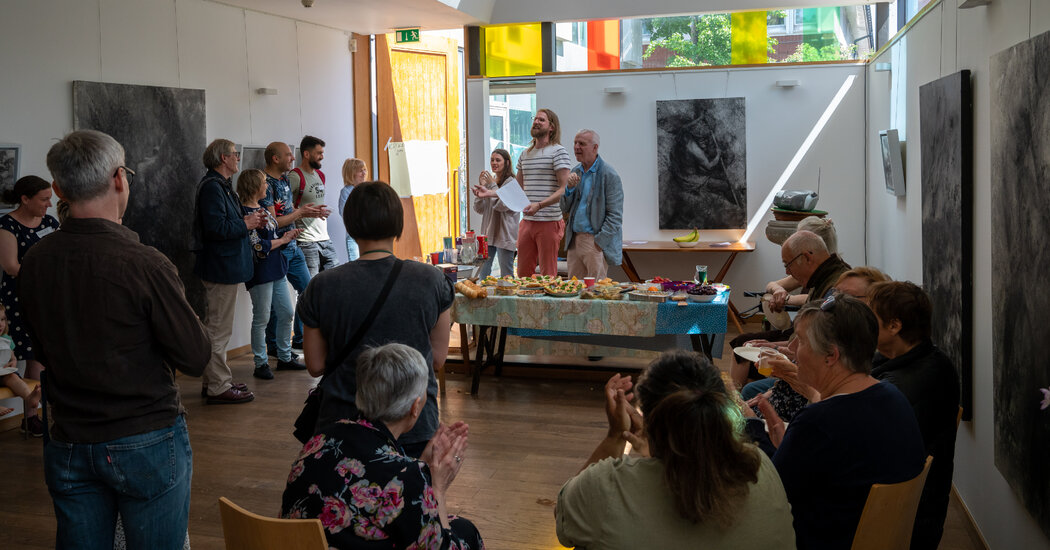
Time and again in his youth, he was confronted with career options wrong for his multiple talents, originality, imagination and critical intelligence — for example, as a chemist’s assistant, and a trial apprenticeship at Hyde’s Drapery Emporium that became “the unhappiest and most hopeless period of his entire life.” Yet some early work like being a student-teacher served him well, giving him the chance to educate himself in the fields of anatomy, mathematics, chemistry, especially biology, geometry, and then win a scholarship to the Normal School of Science. There, his talent for debate and writing, his natural charm and sense of humor, blossomed.
At the Normal School of Science, we see him “always ready to set off on fresh paths,” in Tomalin’s words. “Taking on too much was the way Wells lived his life.” He gave talks at the college Debating Society, one being “The Past and Future of the Human Race,” which foreshadowed by a decade his vision of things to come in “The Time Machine,” a work initially published in the first issue of New Review by his friend William Henley, best known for his poem “Invictus.”
Tomalin, who has written biographies of Charles Dickens, Samuel Pepys and other writers, found that she could not simply deliver the young Wells and confesses that “I have found him too interesting to leave.” Thus, all of Wells’s life emerges here as she takes us carefully through three important, overlapping profiles of one of England’s enduring, most widely read and cited literary artists. One profile is Wells as a social activist determined, as he said, “to write, talk and preach revolution.” He was an atheist, a socialist and the author of scores of books where he frequently dreamed of a better social world; his political publications were as influential and popular as his groundbreaking science fiction tales, which he called “scientific romances.” We learn about his important though not entirely comfortable involvement with the visionary progressives in the Fabian Society. In his best-selling work “Anticipations,” he told a friend, his intention was “to undermine and destroy the monarch, monogamy and respectability — and the British Empire, all under the guise of a speculation about motorcars and electrical heating.” It is no little achievement that his 1940 “The Rights of Man” became “one of the sources for the 1948 Universal Declaration of Human Rights” proclaimed by the United Nations General Assembly.
Wells did, in fact, destroy monogamy and respectability in his own life. Examining at length this unpleasant, sad dimension, Tomalin enables us to see that “he was a bad husband and an unreliable lover,” with the person he hurt the most being his second wife, Jane, who “found herself abandoned for ever longer periods as the years went by, while he carried on his love affairs in blazes of publicity.”
So it is this biography’s last profile of Wells as a prolific, original storyteller that ensorcelled me as a young reader and, as a writer, cemented my respect for him. Though he was often sick, and self-educated, his early literary labors were prodigious. Before his success with “The Time Machine,” he took work copying diagrams for slides sold to medical students, tutored students, devised quiz questions for cheap magazines and wrote two popular science textbooks, one of which he illustrated, yet to him they were hackwork. He edited a journal and weekly, churned out book reviews, tried his hand unsuccessfully at playwriting, sold lightweight pieces to The Pall Mall Gazette, which, to his surprise, earned him more money than he received from teaching. All this is but the iceberg’s tip of his voluminous literary outpourings.




